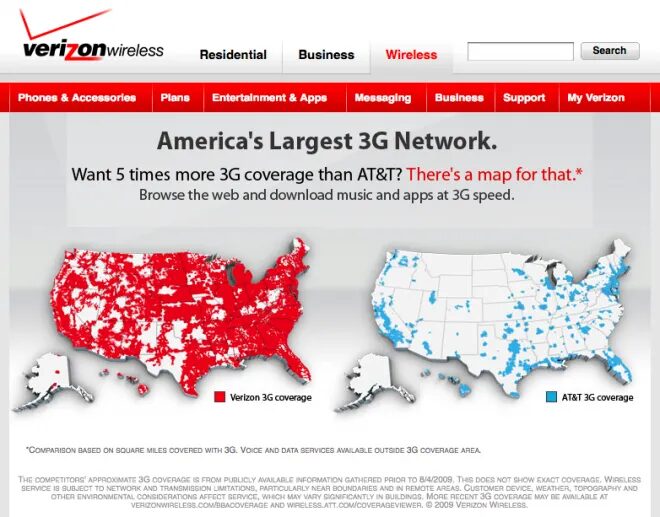When selecting a wireless carrier in the United States, AT&T and Verizon consistently rank among the top choices, known for extensive networks and a wide range of services. Deciding between at&t vs verizon often comes down to evaluating key factors like network coverage, speed, plan value, and customer service based on your individual needs and location.

Network Coverage Showdown
Both carriers boast large, nationwide networks, but they have different strengths.
4G LTE Reliability
Historically, Verizon has often been cited for having the most extensive 4G LTE network coverage, reaching a vast majority of the US population. AT&T also offers broad 4G LTE coverage and recent independent tests (like RootMetrics 2H 2024) have sometimes given AT&T high marks for overall national reliability when considering both 4G and 5G. While Verizon might edge out slightly in population coverage percentage, AT&T may cover more sheer land area, particularly in some rural regions.
Read more about: verizon phones for seniors
The 5G Landscape
The 5G comparison is more nuanced:
- AT&T: Generally has broader availability of its standard 5G network (using low-band and mid-band spectrum), meaning more users might see a “5G” indicator more often.
- Verizon: Offers its high-speed “5G Ultra Wideband” network (using high-band and C-band spectrum) which delivers significantly faster speeds, but its geographic footprint is smaller than AT&T’s standard 5G network, primarily focused on urban and increasingly suburban areas. Verizon also has a standard “5G Nationwide” network with broader reach but slower speeds.
Bottom Line: Verizon often leads in perceived overall reliability, while AT&T provides wider access to some form of 5G. Checking coverage maps specific to your home, work, and travel areas is essential for both carriers.
Speed and Performance Test
Network speed is another critical factor, though performance can vary greatly by location and time.
- Overall Speeds: Independent speed tests (like Opensignal) often show T-Mobile leading in average download speeds. Between AT&T and Verizon, results vary. Some tests might show AT&T slightly ahead in combined 4G/5G metrics, while others show Verizon leading, particularly in consistency or specific 5G metrics.
- 5G Performance: Verizon’s 5G Ultra Wideband generally delivers very fast speeds where available and often scores well in 5G experience and upload speed tests. AT&T’s 5G speeds are typically solid but may not reach the peak speeds of Verizon’s Ultra Wideband in areas where both are present.
- Consistency: Verizon has historically performed well in network consistency metrics, meaning speeds are reliably maintained for users.
Bottom Line: Raw speed leadership often goes to T-Mobile in national averages. Between at&t vs verizon, Verizon tends to excel in 5G performance metrics where its Ultra Wideband is deployed, while overall speeds can be competitive depending on the specific location and testing methodology.
Plan Pricing and Features Face-Off
Both carriers offer similar multi-tiered unlimited postpaid plans.
- Tiered Unlimited Structures: Expect entry-level plans (like Verizon Unlimited Welcome, AT&T Value Plus/Starter) with basic unlimited data (subject to slowdowns during congestion) and fewer perks. Mid-tier plans (Verizon Unlimited Plus, AT&T Unlimited Extra) add premium high-speed data (less likely to slow down) and more hotspot data. Top-tier plans (Verizon Unlimited Ultimate, AT&T Unlimited Premium) offer the most premium data, largest hotspot allowances, and often enhanced international features.
- Pricing Comparison: Prices for comparable tiers are usually very close, often differing by only $5-$10 per month for a single line. Significant savings are available on both carriers when adding multiple lines to a family plan.
- Key Feature Differences: Both include basics like unlimited US talk/text and usually Mexico/Canada usage. Verizon differentiates with its “myPlan” system, allowing customers to add $10/month perks like the Disney Bundle, Apple Music, or extra hotspot data. AT&T’s plans might include different built-in perks on higher tiers (like more included Latin America usage) but fewer optional add-ons. Hotspot data amounts also vary by tier, with AT&T’s top plan historically offering a slightly larger allowance than Verizon’s equivalent top tier, though Verizon’s Ultimate plan now matches AT&T’s Premium at 60GB.
Bottom Line: Plan structures and core features are remarkably similar. Verizon offers more flexibility with its optional perk system, while AT&T might appeal if specific included features align with your needs.
Prepaid Options Compared
Both carriers offer strong prepaid plans as a lower-cost, no-contract alternative. They provide various options with fixed data amounts (e.g., 15GB) or unlimited data tiers, often with discounts for enrolling in Auto Pay. Pricing is competitive, with plans generally starting around $25-$40 per month depending on data and payment terms (some best rates require annual payment).
Customer Service and Satisfaction
Customer service perception can be subjective and rankings fluctuate. Both AT&T and Verizon are major companies with extensive support systems. Independent surveys (like ACSI, JD Power) often place them relatively high among wireless carriers, though sometimes behind T-Mobile in recent user satisfaction scores. Verizon frequently scores well in network quality studies (measuring dropped calls, fewest problems).
Deals and Device Offers
Both carriers heavily incentivize switching and upgrading with aggressive phone deals. Expect offers for “free” flagship phones (via 36-month bill credits) requiring a new line and specific unlimited plans, often with a trade-in. Both also offer Bring Your Own Device (BYOD) credits or gift cards. The specific value of deals changes constantly, so comparing current offers directly is crucial when making a decision.
The Verdict: AT&T vs Verizon – Which is Right for You?
The best choice in the at&t vs verizon debate depends on your priorities:
Choose Verizon If…
- Overall network reliability and consistent performance are your top priorities.
- You live or work in an area with strong 5G Ultra Wideband coverage and want the fastest possible mobile speeds.
- You value the flexibility of adding specific perks (streaming, storage, etc.) to your plan via the myPlan system.
Choose AT&T If…
- You prioritize having the broadest standard 5G network coverage available across more locations.
- You can benefit from bundling your wireless service with AT&T Fiber internet if available in your area.
- You find their specific plan features or slightly lower entry-level pricing more appealing.

